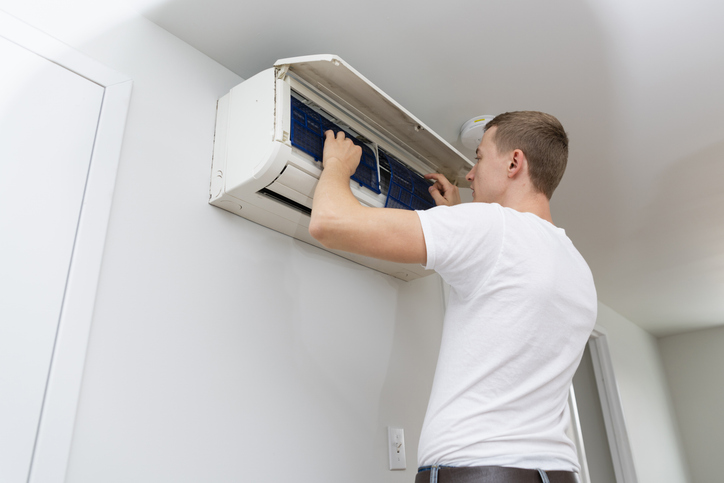When it’s time for an air conditioner (AC) replacement, one of the most crucial factors to consider is sizing. Choosing the right-sized unit for your home ensures optimal performance, energy efficiency, and cost savings. An improperly sized AC can lead to issues such as insufficient cooling, higher energy bills, and unnecessary wear and tear on the system. Understanding the role of proper sizing during AC replacement is vital in making an informed decision that keeps your home comfortable and your energy costs low.
1. The Importance of Proper AC Sizing
Selecting the correct size AC unit is essential for achieving ideal comfort. An air conditioner that’s too small won’t effectively cool your home, leaving you hot and uncomfortable. On the other hand, a unit that’s too large will cycle on and off frequently, reducing its lifespan and efficiency. A properly sized AC unit ensures consistent cooling, enhanced energy efficiency, and long-term reliability.
2. How Sizing Affects Energy Efficiency
A properly sized AC unit works more efficiently, lowering your energy consumption and bills. When an air conditioner is the right size for your home, it can maintain a consistent indoor temperature without overworking. Units that are too small will have to work harder to cool a larger space, consuming more energy. Oversized units, on the other hand, cool the space too quickly without properly dehumidifying, leading to wasted energy and discomfort.
3. Calculating the Ideal Size for Your Home
The ideal AC size is measured in tons, with one ton equaling the ability to cool 12,000 BTUs (British Thermal Units) per hour. To determine the best size for your home, several factors come into play, such as square footage, ceiling height, insulation quality, and the local climate. A professional HVAC technician will perform a Manual J load calculation to determine the correct size based on these variables. This ensures your new air conditioner replacement will meet your cooling needs effectively.
4. Consequences of Oversized and Undersized Units
Choosing an oversized or undersized AC unit can lead to a host of problems. An oversized unit cools the space too quickly, causing it to turn on and off frequently. This short cycling prevents proper dehumidification, resulting in a damp, uncomfortable environment. Additionally, the frequent cycling puts stress on the system, shortening its lifespan. On the other hand, an undersized unit will struggle to cool the space, running continuously and using excessive energy. Both situations result in higher maintenance costs and increased energy bills.
5. How Professional AC Sizing Can Save You Money
While it may be tempting to go for a unit that seems powerful or cheaper, professional AC sizing ensures you’re making a cost-effective investment. A properly sized air conditioner will require fewer repairs, use less energy, and last longer. Hiring an experienced HVAC technician for sizing your new AC unit saves you money in the long run by maximizing the efficiency and lifespan of your system. Furthermore, with an appropriately sized AC, you’ll enjoy consistent comfort without the fluctuations that come with improper sizing.
6. The Role of Insulation and Ventilation in Sizing
Good insulation and proper ventilation are key factors in determining the right size for your AC upgrade. Homes with poor insulation may require a larger unit because the cool air leaks out, making the system work harder. Well-insulated homes with optimal ventilation will hold cool air more effectively, potentially requiring a smaller unit. Proper ventilation, including ductwork and airflow management, also plays a significant role in ensuring your AC unit runs efficiently.
7. Selecting the Right AC Technology
Modern AC units come with advanced technologies such as variable-speed compressors and smart thermostats that help adjust the unit’s performance based on your home’s needs. These systems may allow for more flexibility in sizing, but they still need to be appropriately matched to the size of your home. Technology can optimize energy use, but proper sizing ensures that the unit functions within its capacity to deliver the best performance.
8. The Impact of Local Climate on AC Sizing
The climate in your area plays a significant role in the sizing of your AC system. In hot and humid climates, a larger unit may be needed to handle the extreme heat and humidity levels. In contrast, homes in cooler regions may not require as much cooling power. Consulting with a local HVAC technician will ensure that the AC upgrade is tailored to the specific conditions of your area, providing the right cooling capacity and avoiding wasted energy.
Proper sizing is one of the most important considerations when choosing an AC replacement. A correctly sized unit ensures efficient performance, lowers energy costs, and reduces wear and tear on your system. By working with a professional HVAC technician to determine the ideal size, you can enjoy a comfortable home and peace of mind knowing your new system is working at its best. Proper sizing helps you avoid the pitfalls of oversized or undersized units, ensuring a smooth, cost-effective cooling solution.
For the best AC replacement, choose the right size for maximum comfort and efficiency! Call our proficients at Xpress Quality Services at (813) 843-0200 for professional advice and flawless AC installation today.



